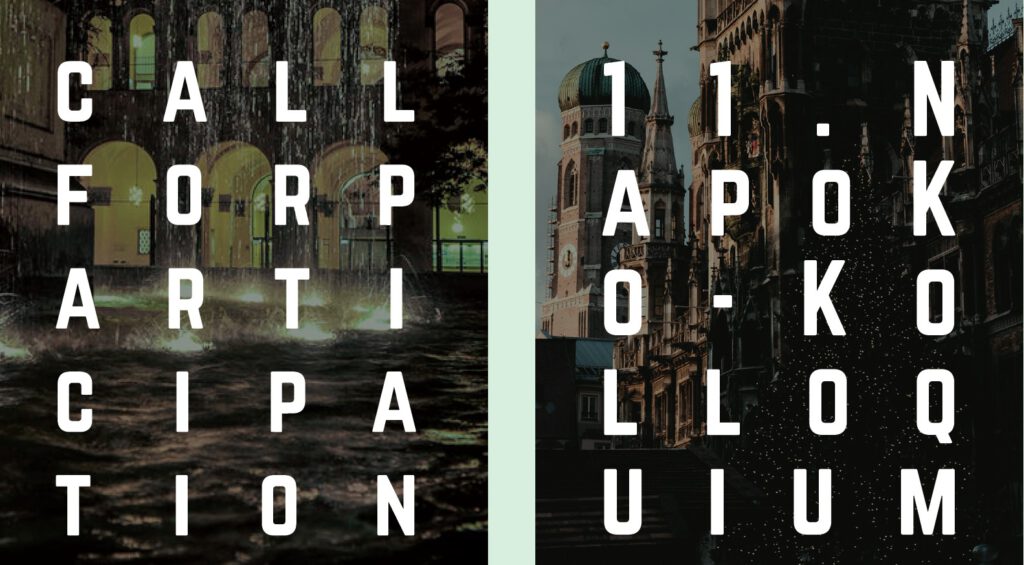CfP VERLÄNGERUNG: 11. NapoKo-Kolloquium 2020

11. Napoko-Kolloquium vom 25. bis 27. November 2020 als digitale Konferenz (in München). #napoko20
VERLÄNGERUNG DES CALL FOR PAPERS: Extended Abstracts können noch bis zum 30. September 2020 an sprecher@napoko.de geschicht werden.
Das Institut für Kommunikationswissenschaft und Medienforschung (LMU München) lädt herzlich ein.
Was ist das NapoKo-Kolloquium?
Das jährlich stattfindende Kolloquium richtet sich an Nachwuchswissenschaftlerinnen und Nachwuchswissenschaftler sowie Praktikerinnen und Praktiker im Bereich der politischen Kommunikation, die ihre laufenden Forschungsarbeiten bzw. Projekte präsentieren und mit Expertinnen und Experten aus Wissenschaft und Praxis diskutieren möchten.
Wie läuft das Kolloquium ab? Was ist 2020 neu?
Im Mittelpunkt des Kolloquiums stehen eure Forschungsarbeiten und Projekte, die ihr in einem aufgezeichneten 15-minütigen Vortrag präsentiert. Der Vortrag wird den Teilnehmenden und Respondents vorab zur Verfügung gestellt. An den Konferenztagen wird es in Live-Sessions zunächst noch einmal eine kurze Zusammenfassung eures Vorhabens/Vortrags als Grundlage für das Feedback von Respondents sowie eine halbe Stunde Zeit für konstruktives Feedback und Vorschläge aus dem Plenum geben. Eure Vorträge werden in thematische Sessions eingeteilt und sind für Donnerstag und Freitag geplant. Am Mittwochabend findet ein digitales Get Together zum ersten Kennenlernen und Austauschen statt.
Wie könnt ihr am Kolloquium teilnehmen?
Der Call ist thematisch offen. Ihr könnt zu allen Themengebieten der Politischen Kommunikationsforschung einreichen. In einem Praxis-Track kann auch der Nachwuchs aus politischen Beratungen oder Parteien eigene Projekte präsentieren und der wissenschaftlichen Diskussion stellen. Haben wir euer Interesse geweckt? Dann fasst eure Arbeit (Dissertation, Magister-, Master- und Bachelorarbeit oder Forschungs- bzw. Praxisprojekt) in einem Extended Abstract (800 bis max. 1000 Wörter, exklusive Literaturverzeichnis, Abbildungen und Tabellen) zusammen und schickt es bis 14. 30. September 2020 an sprecher@napoko.de.
Was solltet ihr bei der Einreichung beachten?
Beschreibt die Grundlagen und das (geplante) methodische Vorgehen sowie ggf. Hypothesen und (vorläufige) Ergebnisse möglichst prägnant. Fügt eurem Abstract außerdem noch ein separates Deckblatt mit Vortragstitel, Art des Projekts (BA, MA, PhD, etc.), Namen des Vortragenden, institutioneller Zugehörigkeit, Kontaktdaten und ggf. Betreuungsperson(en) des Projekts bei. Entfernt auch jegliche Angaben, die auf euch hinweisen, aus dem Textdokument und den Meta-Daten. Somit können wir eure Einreichung anonymisiert begutachten.
Wie geht es nach der Einreichung weiter?
Wir sagen euch Mitte Oktober Bescheid, ob ihr eure Forschungsarbeit oder Euer Projekt auf dem Kolloquium präsentieren könnt. Bei Annahme für einen Vortrag im Rahmen des Kolloquiums ist ein mit Powerpoint aufgenommener Vortrag, der den Respondents und anderen Teilnehmenden zur Verfügung gestellt wird, bis zum 16.11. einzureichen.
Wir freuen uns auf Eure Einreichungen!
Jörg Haßler | Ausrichter | LMU München
Christina Peter | Ausrichterin | LMU München
Julian Unkel | Ausrichter | LMU München
Katharina Esau | NapoKo Sprecherin | HHU Düsseldorf
Simon Kruschinski | NapoKo Sprecher | JGU Mainz
English version of our CfP
11th NapoKo-Colloquium from 25 to 27 November 2020 as digital conference (in Munich)
EXTENSION OF CALL FOR PAPER: Extended abstracts can be sent to sprecher@napoko.de until September 30, 2020.
The Department of Media and Communication (LMU Munich) invites you.
What is the NapoKo colloquium?
The colloquium is for early career researchers and practitioners in the field of political communication who want to present their completed or ongoing research or project and discuss them with senior academics and practitioners.
How does the colloquium work? What is new in 2020?
The focus is on your research or project, which you will present in a pre-recorded 15 minute talk. The presentation will be made available to the participants and the respondents prior to the conference. At the days of the conference, there will be live-sessions that will start with a short summary of your project, followed by feedback and suggestions in a 30 minute discussion initiated by the respondent. The presentations will be grouped into thematical sessions and will be scheduled for Thursday and Friday. On Wednesday evening there will be a digital get-together.
How can you take part in the colloquium?
We have an open call, meaning that you can submit your ideas on any topic in the context of political communication research. In a practioneers’ session, participants from political consultancies or political parties can also present their projects and put them up for scientific discussion. Did we catch your interest? Then summarize your project (dissertation, master‘s, bachelor‘s) in an extended abstract and submit it to: sprecher@napoko.de (800 to 1000 words max., excluding references, figures and tables) by September 14th 30th 2020.
What should your submission entail?
Describe the basics and the (planned) methodological approach as well as hypotheses and (preliminary) results as precisely as possible. Attach a separate cover page with the presentation´s title, type of project (BA, MA, PhD, etc.), the presenter´s name, institutional affiliation, contact details and, if applicable, the project supervisor(s). Be sure to remove any information about the author from the text document and the metadata for blind-review.
What happens after the submission?
We will send out notifications mid-October. If your submission is accepted, you will have to submit a pre-recorded Powerpoint presentation no later than November 16th. The presentation and the extended abstract will be made available to respondents and other participants to prepare for the colloquium.
We are looking forward to your submissions! – While we welcome submissions in English please be aware that the conference will be held mostly in German.
Jörg Haßler | Ausrichter | LMU München
Christina Peter | Ausrichterin | LMU München
Julian Unkel | Ausrichter | LMU München
Katharina Esau | NapoKo Sprecherin | HHU Düsseldorf
Simon Kruschinski | NapoKo Sprecher | JGU Mainz